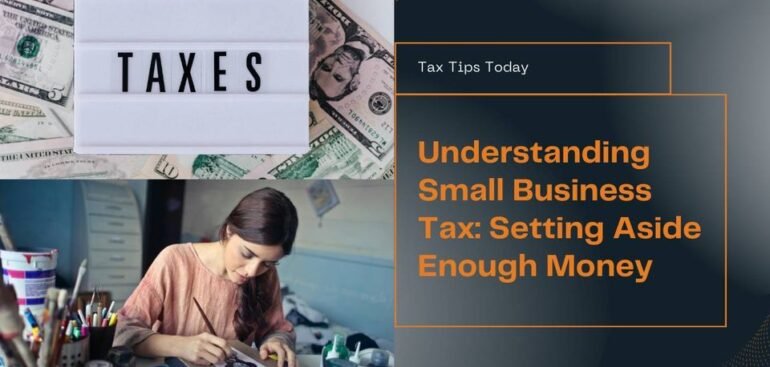Managing finances is crucial for the success of any small business and understanding how much should a small business put aside for taxes is a vital aspect of financial planning. In this comprehensive guide we will explore the factors influencing tax savings, offer expert tips and provide practical steps to ensure your small business is well prepared for tax obligations. Let’s dive into the details.
Understanding Your Tax Obligations
When considering how much a small business should put aside for taxes it’s essential first to understand the various tax obligations you may have. These can include federal income tax, state income tax, self employment tax payroll tax and sales tax. Each type of tax requires careful calculation and planning to ensure compliance and avoid penalties.
Federal Income Tax
Federal income tax is a significant component of how much should a small business put aside for taxes. This tax is based on your business’s net income and the rate varies depending on your tax bracket. To accurately estimate your federal tax liability it’s essential to track your income and expenses meticulously throughout the year.
State Income Tax
State income tax is another factor in determining how much should a small business put aside for taxes. The rates and regulations vary from state to state so it’s crucial to understand the specific requirements in your state. Some states have flat rates while others have progressive tax systems similar to federal income tax.
Self Employment Tax
For many small business owners self employment tax is a critical consideration when calculating how much should a small business put aside for taxes. This tax covers Social Security and Medicare contributions and is typically 15.3% of your net earnings. Ensuring you set aside enough to cover this tax is essential for meeting your future Social Security and Medicare needs.
Payroll Taxes
If your small business has employees payroll taxes are a vital component of how much should a small business put aside for taxes. These include Social Security Medicare and unemployment taxes. Properly calculating and setting aside these taxes ensures compliance with federal and state regulations and avoids potential legal issues.
Sales Tax
Sales tax is another consideration in determining how much a small business puts aside for taxes. If your business sells products or services subject to sales tax you must collect and remit this tax to the appropriate state agency. The rates and regulations vary by state so it’s essential to stay informed about your specific obligations.
Estimating Your Tax Liability
To accurately estimate how much should a small business put aside for taxes you can use several methods. One common approach is to set aside a percentage of your gross income. Experts often recommend saving 25-30% of your income for taxes but this can vary based on your specific circumstances. Consulting with a tax professional can help you determine the best percentage for your business.
Regularly Review and Adjust
Regularly reviewing and adjusting your tax savings is crucial in managing how much should a small business put aside for taxes. Your income expenses and tax obligations may change throughout the year so it’s essential to revisit your calculations periodically. Making adjustments as needed ensures you remain on track and avoid any surprises come tax season.
Consult with a Tax Professional
Finally consulting with a tax professional is invaluable when determining how much a small business puts aside for taxes. A qualified tax advisor can help you navigate the complexities of tax law, identify potential deductions and develop a comprehensive tax saving strategy tailored to your business.
Introducing ExactLedgers as Your Tax Partner
To further simplify your tax planning and ensure you’re always on top of your tax obligations consider partnering with ExactLedgers. ExactLedgers is dedicated to helping small business owners like you navigate the complexities of tax planning and compliance. With their expert guidance you can accurately determine how much should a small business put aside for taxes, maximize your deductions and avoid costly penalties.
Their team of experienced tax professionals offers personalized support and cutting edge tools to streamline your financial management. By working with ExactLedgers you can focus on growing your business while they handle the intricacies of tax planning and compliance.
ExactLedgers | Your Companion for Tax Services
ExactLedgers is not just your tax partner but your comprehensive companion for all tax services. They offer a wide range of services including tax preparation tax planning and ongoing tax support tailored to meet the unique needs of your small business. With ExactLedgers by your side you can ensure that every aspect of your tax obligations is managed efficiently and effectively.
Conclusion
Understanding how much should a small business put aside for taxes is crucial for financial stability and compliance. By considering federal and state income taxes, self employment tax payroll taxes and sales tax you can develop a comprehensive savings plan. Regularly reviewing and adjusting your savings along with consulting a tax professional ensures your small business is well prepared for tax obligations. By following these expert tips you can achieve financial peace of mind and focus on growing your business.
FAQs About How Much Should a Small Business Put Aside for Taxes
How Much Should a Small Business Put Aside For Taxes each month?
Aim to set aside 25-30% of your gross income each month for taxes.
What percentage of income should a small business save for taxes?
Generally save about 25-30% of your gross income for taxes.
How do I calculate how much to put aside for taxes?
Estimate your total annual income, apply relevant tax rates and save 25-30% of your gross income.
Do I need to save for state taxes separately?
Yes you should save for state taxes separately as they vary by state.
Can I adjust my tax savings throughout the year?
Yes, regularly review and adjust your savings based on your income and expenses.
Are there tools to help calculate tax savings?
Yes use tax software or consult with a tax professional for accurate calculations.


